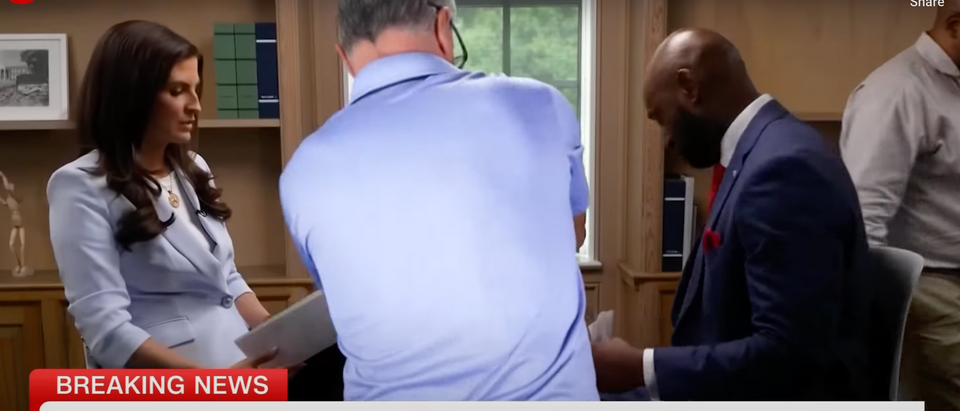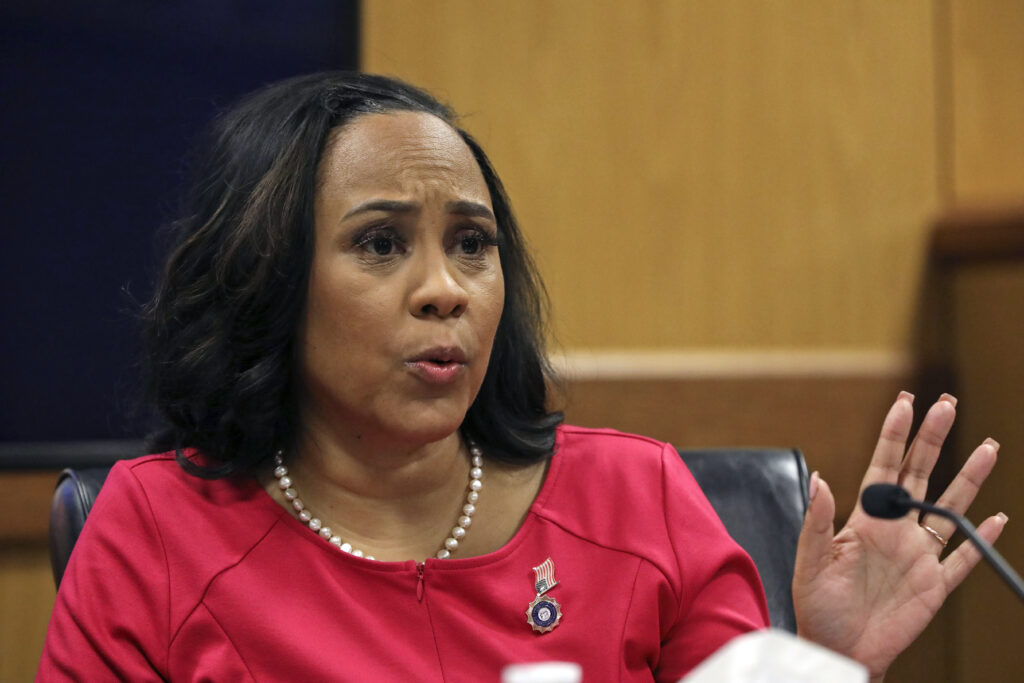Could Fani Willis’s Ex-Boyfriend, After CNN Interview Interrupted by a ‘Consultant,’ Get Her Thrown Off the Trump Prosecution?
The Georgia Court of Appeals could be unconvinced by the protestations of the pair that they began dating only after Nathan Wade was hired.

The disastrous performance on CNN of District Attorney Fani Willis’s former boyfriend and special prosecutor, Nathan Wade, is emerging as a central complication to her efforts to avoid disqualification from the case she brought against President Trump and 18 others.
Judge Scott McAfee found that an “odor of mendacity” was emitted by the relationship between the district attorney and the special prosecutor her office paid more than $650,000 to try Trump. The trial court judge, though, allowed Ms. Willis to stay on the case if Mr. Wade resigned. He did so with dispatch.
By “mendacity,” Judge McAfee appeared to be referring to the romantic timeline offered under oath by Ms. Willis and Mr. Wade when they claimed their romance did not begin until after Mr. Wade had been hired by Ms. Willis. A former colleague of Mr. Wade’s, Terrence Bradley, had texted a lawyer, Ashleigh Merchant, that the relationship began before Mr. Wade came on the case. On the stand, though, Mr. Bradley refused to confirm that timeline.
That account was contradicted by Ms. Willis’s college friend and former colleague, Robin Yeartie, who testified that the romance began in 2019 before Mr. Wade became separated from his wife, Joycelyn. Ms. Yeartie alleges that she saw the couple “hugging, kissing, and being affectionate” before November 2021 when Ms. Willis hired Mr. Wade.

When Mr. Wade was hired as a special prosecutor, he had never prosecuted a felony. While he was being paid by Fulton County, Mr. Wade and Ms. Willis took trips together to Aruba, Belize, and Napa Valley. The district attorney claims that she reimbursed Mr. Wade for those excursions. Judge McAfee found that to be “not so incredible as to be inherently unbelievable.” Ms. Willis’s father testified that she kept large amounts of cash around because it was “a Black thing.”
Now, though, the question of when the amorous relationship between Mr. Wade and Ms. Willis began could surface again as the Georgia Court of Appeals considers whether to overrule Judge McAfee and disqualify Ms. Willis. They elected to take Trump’s appeal, indicating an interest in reviewing Judge McAfee’s ruling. Ms. Willis has urged them to dismiss the appeal for lack of evidence.
Mr. Wade’s interview could provide fodder to the Court of Appeals, which is staffed with a majority of justices appointed by Republican governors. Last week, CNN’s Kaitlan Collins asked Mr. Wade “when the romantic relationship between” him and Ms. Willis began. Mr. Wade answered “Yes, so we get into… there’s been this effort to say that, OK, these exact dates are at issue and these exact dates are.”
At that moment, a man CNN identified as a “consultant” entered the picture and pulled Mr. Wade aside for a huddled conversation near a bookcase. They conferred while the cameras rolled on their backs. Mr. Wade returned, and Ms. Collins asked him if “everything was OK” and to “clarify when the romantic relationship started and when it ended.” Mr. Wade responded that he would not “choose to say or do anything that would jeopardize the case.”

Mr. Wade, who also divulged that he “regularly speaks” with Ms. Willis even though he no longer dates her, also attended her victory party after she recently notched a win in her Democratic primary election. That virtually ensures her election to a new term at overwhelmingly Democratic Fulton County, which comprises much of downtown Atlanta.
Trump contends that the relationship led to Mr. Wade’s hiring. He has adduced cellular phone data that indicate the two exchanged more than 2,000 phone calls and nearly 10,000 texts that predate Mr. Wade’s hiring. Ms. Willis disputes the accuracy of that data.
Mr. Wade and Ms. Willis both maintain that the romance began only after Mr. Wade was hired in November of 2023. He has told ABC News that workplace romances of the kind he engaged in with Ms. Willis are “as American as apple pie.” Trump contends that their romance amounts to a conflict of interest that warrants her disqualification and the dismissal of the charges she brought.
Judge McAfee, who himself last month won an election to keep his seat, found that “neither side was able to conclusively establish by a preponderance of the evidence when the relationship evolved into a romantic one.” The judge, though, entertained the possibility that Mr. Wade and Ms. Willis “testified untruthfully about the timing of their relationship.” Judge McAfee detected a “significant appearance of impropriety” that was cured by Mr. Wade’s departure. The Court of Appeals will decide if that suffices.

Courts of appeal review questions of law by a de novo standard, meaning that they employ a fresh analysis without deference to the decisions of the trial court judge. The Georgia Court of Appeals could find that Judge McAfee erred in finding an actual conflict of interest, rather than the appearance of impropriety, necessary for disqualification. This could be Trump’s best hope for a reversal.
Judge McAfee’s ruling with respect to evidence — say, on when the relationship between Ms. Willis and Mr. Wade began — will likely be reviewed under an abuse of discretion standard. This involves significant deference to the lower court judge when it comes to his evaluation of the evidence. A reversal is possible, but only if the trial court judge’s evidentiary findings are clearly wrong. Trump is pushing for oral arguments, likely to push this point.
Trump could argue on appeal that Judge McAfee’s own description of the evidence hardly signifies confidence in his conclusion. The judge admits to the persistence of that “odor of mendacity” and declares that he “is not under an obligation to ferret out every instance of potential dishonesty from each witness or defendant.” The more Mr. Wade talks, the more the appeals court could feel emboldened to do the ferreting out that Judge McAfee declined to undertake.

